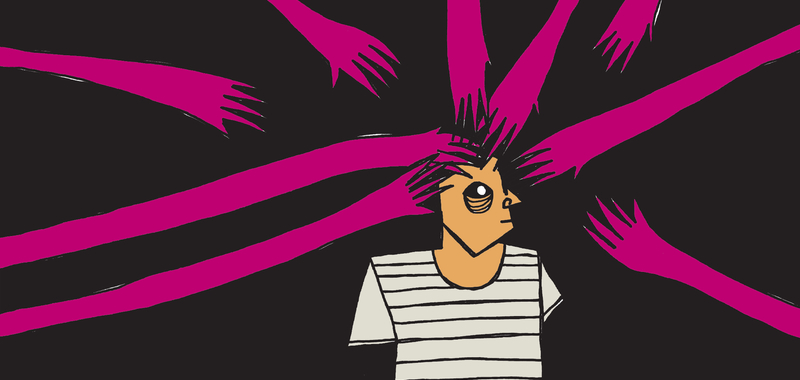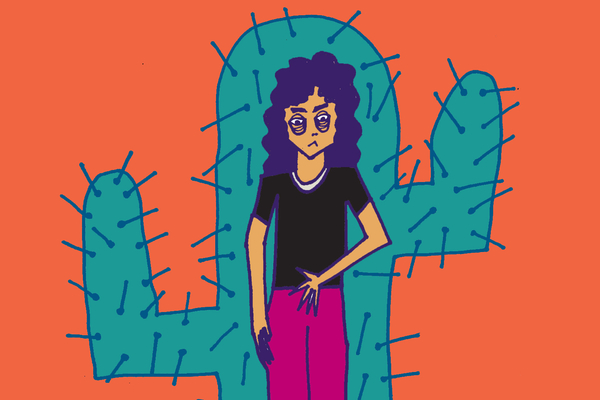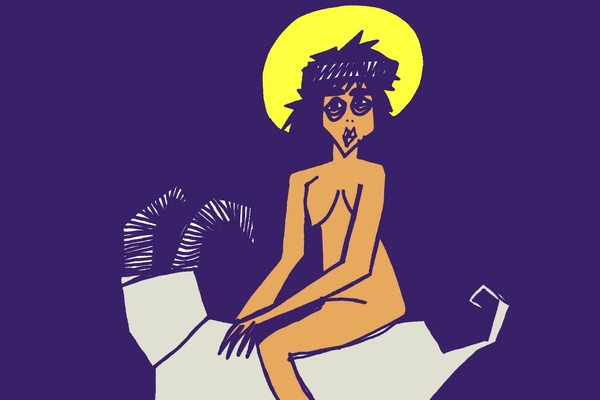Mental health professionals need to create sensitive and friendly healing spaces, critical and alert psychological researches, and a mental health establishment able to live up to its responsibilities.
Translated by Yasmine Zohdi
The conversation about gender and sexual diversity (GSD) in the field of mental health in the Palestinian community reveals a bit of a problem, as it is made up of two main components, each with its own challenges. After all, the mental health field in Palestine is still under development, and has not yet reached the level of institutionalization that would give it full credibility. According to the Palestinian Counseling Center, a limited number of people in our society avail themselves to — or even know of — psychotherapy. The same applies to issues of GSD, which are widely considered taboo in Palestinian society, and are therefore often marginalized, sometimes even consciously neglected, despite undeniable progress on both fronts (mental health and GSD issues) in recent years.
The question of the relationship between GSD and the mental health establishment opens up bigger questions about the nature of the establishment itself. Two years into her career as a counselor and psychotherapist, Fidaa Aliyan questions the psychological establishment in its entirety as an oppressive entity, just like the scientific establishment as a whole.
Aliyan believes that the Diagnostic and Statistical Manual (DSM), according to which most counseling advice is given or treatments are administered, is essentially founded on the idea of control, as the counselee has to be categorized as suffering from a certain disorder. She dubs this as “diagnostic obsession.”
“Of course diagnosis is important in psychological practice, as it determines the most suitable forms of intervention for the counselee,” Aliyan explains. “But this increasing obsession may be stemming from an institutional need rather than a therapeutic one, which opens the door to doubt and concern, and limits the ability of both parties — the counselor and counselee — to decipher and examine the counselee’s most important questions, which could help them gain more insight into themselves,” Aliyan explains.
Yet Aliyan does not hold professionals or workers in the field responsible for such issues, rather, she blames the bigger establishment. “The fear of counselors to pursue diagnosis-free counseling is valid and real, it is not unreasonable,” she says. When you look at the educational and professional establishments of psychology, how neglectful they’ve been of the essence of human desire, and how negligent to protect those who work within them — that is the real problem.”
This problem of diagnosis, as expressed by Aliyan, leads us to think of issues such as homosexuality and gender identity, among others, and how psychology has evolved ever since its establishment as a modern science. Homosexuality, for instance, was considered a psychological disorder for 22 years (from 1952 to 1974) by the American Psychological Association. As for gender identity, and after decades of disagreement among doctors and psychologists in regards to its classification, transsexuality was added by the association to the third version of its list of disorders as Gender Identity Disorder in 1980. This categorization — even though it did help some transsexual persons — led to many treating treanssexuals as psychologically impaired persons, which eventually led to the removal of transsexuality from the list in 2013.
To know more about the status of issues of GSD and the challenges they face, we can take a look at their representation in Psychology and mental health departments in different universities. For example, Fardous Salama, faculty member in the Psychology program in Birzeit University, points out that issues pertaining to sexuality and GSD are largely marginalized in the program’s courses, except for one unit that covers the evolution of gender and sexual identity as part of an Evolutionary Psychology course.
Salama, who has taught the course, says that the process of introducing such concepts to the program is met with different reactions from students and lecturers alike, sometimes positive and sometimes negative. Some students, she says, reject the inclusion of such issues and claim that this part of the curriculum “falsifies facts,” using both religious and scientific arguments. Others, however, even if they are uneasy at first, show an eagerness to learn and find out more.
As for the teachers, Salama says, even though some of them do not approve of this relatively progressive content, they don’t express their views publicly, and their misgivings would not lead to scrapping this component in all cases.
Despite challenges, however, Salama stresses that there has been clear, tangible progress. “Five years ago, it was difficult to organize a workshop around the notion of sexuality, and we would be questioned by some entities in the university,” she says. “Today, we are relatively free to speak about issues like gender identity and homosexuality, and to organize workshops and trainings pertaining to them as well.”
From the student side, Zakeyya Zeita, a masters student in the mental health program in Al-Quds University – Abu Dis, chose to write her thesis about the difficulties homosexual people face in Palestine. She chose this subject, she says, because it had never been approached in Palestinian society, which also encouraged her thesis supervisor to accept the project.
Zeita says that one of the biggest challenges facing researchers in psychology when tackling the issue of homosexuality is the lack of adequate modern references in the Arabic language; most are really old and cite outdated western references. As for the representation of the issue in university courses and curricula, Zeita says that it is almost always mentioned merely in passing, and that there are no courses entirely devoted to it. “The first time I was seriously exposed to the issue was through a course I took with Al-Qaws,” she adds.
Al-Qaws for Sexual and Gender Diversity is a civil society organization that has been active in the Palestinian community for more than one and a half decades, working to change society’s prejudices and misconceptions. Part of the organization’s work is conducting capacity trainings for mental health institutions, and annually assembling a team of guidance groups to raise the awareness of counselors and therapists on such issues and help them incorporate this knowledge into their practice. One of Al-Qaws’s most notable achievements in this regard was issuing a booklet titled “Introduction to Gender and Sexual Diversity Issues for Mental Health Professionals.”
The booklet, which was issued last February, can be considered a manual for dealing with issues requiring psychological or social services intervention. Over 90 pages, it covers a myriad of related topics, from the evolution of gender and homosexual identities, how families deal with the question of sexuality, as well as domestic and societal violence. It closes with a number of recommendations on how to deal with such cases in counseling and therapy sessions.
Dr. Fathy Fleifel, director of the Mental Health Center in the Palestinian Red Crescent, and a member of the committee that supervised the writing of the booklet, says that the production of such a publication is an important step towards creating a critical and professional mental health environment for handling such issues of gender and sexuality. For the process of preparing the booklet, he was accompanied by four mental health professionals from Palestine, coming from different professional backgrounds, including art therapy, clinical psychotherapy and psychological counseling.
What was interesting, Dr. Fleifel says, was how their varying cultural and theoretical backgrounds manifested in varying points of view around some of the issues addressed in the booklet. Moreover, he says, the discussions the team had about the language and the terms used in the booklet ultimately enriched it. For example, it was because of psychology specialist Yead Ghandri-Hakim’s interest in the question of loss that they included it in the part about the evolution of homosexual identity.
A lot of these conversations are closely linked to the wider context of mental health and psychotherapy in Palestine, even the Arab world. A big part of the impaired knowledge when it comes to such issues is in the lack of appropriate, unified concepts and terms. This was clearly felt when working on the book, for instance, when it came to translating the term Gender Dysphoria. The closest possible Arabic equivalents were closer to the terms Gender Unsettlement, Gender Incompatibility, and Gender Alienation. The committee finally decided on the last one for being the most accurate in describing the condition, in their view.
In conclusion, there is no doubt that working on issues of GSD in mental health is a pressing need, and even though there are a lot of challenges down the road, professionals in the field need to put a lot of effort into this in order to eventually create sensitive and friendly healing spaces, critical and alert psychological researches, and, overall, a mental health establishment able to live up to its responsibilities.



Add new comment